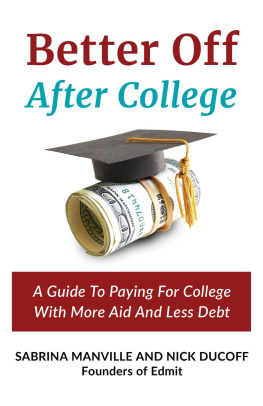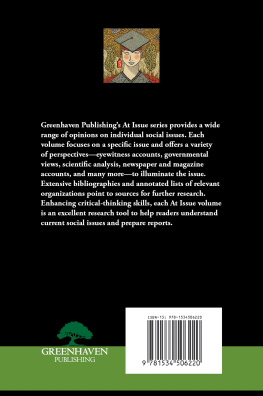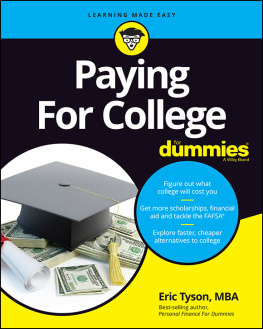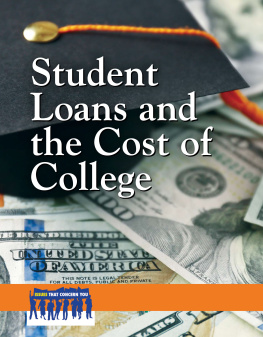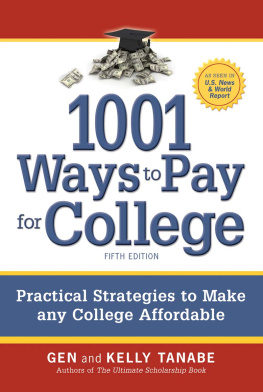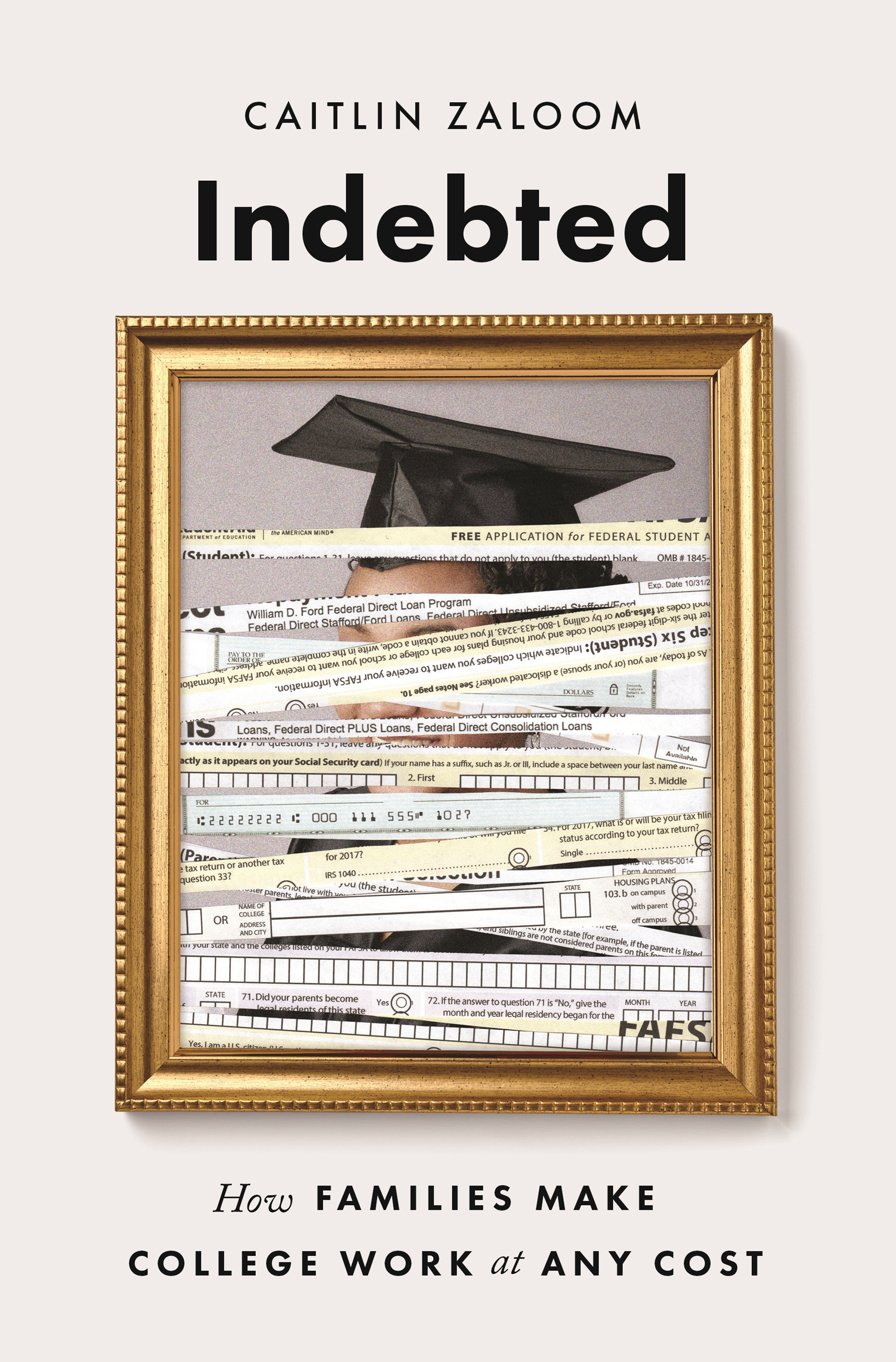Requests for permission to reproduce material from this work should be sent to permissions@press.princeton.edu
Acknowledgments
My first debt is to the families who opened up their lives for this book. From their mundane challenges in making ends meet to their tenderest hopes for the future, our discussions required sensitive, thoughtful, and sometimes difficult reflections. I am honored and grateful that they chose to share their stories.
Indebted took several years to research and write and, along the way, colleagues and friends have inspired and sustained me. The brilliance of three womenJessica Blatt, Liza Featherstone, and Kim Phillips-Feinprovided momentum from the first idea to the final word. Their incisive observations and always necessary humor were vital to the project. Essential conversations came in many different guises too, some in formal seminar settings, some over lunch, and some by timely accident. Kathryn Edin and Andrew Cherlin offered advice and encouragement at a critical stage. Harvey Molotch and Dana Polan were the model readers every author wishes for.
Charley Ballard, Laura Bear, Dominic Boyer, Finn Brunton, Lily Chumley, Arianne Chernock, Charlie Eaton, Matthew Engelke, Nancy Fraser, Sophie Gonick, Linda Gordon, Jane Guyer, Keith Hart, Andrew Lakoff, Shamus Khan, Margaret Levi, Sharon Marcus, Jennifer Morgan, Terry MacDonald, Federico Neiburg, Julia Ott, Mary Patillo, Mary Poovey, Allison Pugh, Liz Roberts, Natasha Schll, Lisa Servon, Rachel Sherman, Ellie Shermer, Brenda Stevenson, Erica Robles-Anderson, Tom Sugrue, Fred Turner, and Matt Wray all helped me understand the questions of debt and family life more deeply.
Thinking and working has always required great companions and there could be no better than Daniela Bleichmar, Brooke Blower, Bruce Buchanan, Miles Corak, Debi Cornwall, Cybelle Fox, Wendy Edelberg, Bob Frank, Tom Frank, Batja Gomes de Mesquita, Terry Maroney, Liz Maynes-Aminzade, Doug McAdam, Kelley McKinney, Rowan Ricardo Phillips, Ben Platt, Eyal Press, Anne Rademacher, Imani Radney, Megan Stephan, and Natasha Warikoo. Their intelligence and wit have helped me see a wider world.
Lively debate is one of the chief privileges and pleasures of academic life, and I am grateful to audiences at Brandeis, the Center for Advanced Study in the Behavioral Sciences at Stanford, Columbia, CUNY, Johns Hopkins, London School of Economics, the New School, Princeton, the Russell Sage Foundation, Stanford, the University of Chicago, the University of Pennsylvania, Universidade Federal do Rio de Janeiro, the University of Southern California, and Washington University in St. Louis for pushing me to think on my feet. Every confab improved the book, as did engaging with the detailed commentary of the one anonymous reviewer for Princeton University Press.
I have been graced with a set of outstanding collaborators who have worked as research assistants on this project. Max Besbris, Daniel Cueto, Max Cohen, Margaret Czerwienski, Alexandra Friedus, Keshan Garib, Caitlin Petre, and Katie Winograd were each essential to the research and writing.
From the beginning, Brettne Blooms conviction helped me see the potential in this project; I am thankful to have an agent whose smarts match her savvy. I was lucky to have Fred Appels editorial acumen behind the books development. His insight and enthusiasm kept me at the keyboard. Emily Looses structuring prowess and pointed questions helped strengthen my arguments. More recently, Meagan Levinson has brought her discerning eye to the book and the crack team at Princeton University PressMatt Rohal, Jill Harris, and Dimitri Karetnikovas well as copyeditor Jennifer McClain winged Indebted into printed existence.
I couldnt have written Indebted without the time to dive into the research and then the space to reflect and to write. The generous institutional support of the Russell Sage Foundation, the Center for Advanced Study in the Behavioral Sciences at Stanford, and the Paduano Faculty Fellowship in Business Ethics at NYUs Stern School enabled these scholarly essentials. Their extraordinary resources have complemented the ongoing support I am fortunate to receive from the staffs of NYUs Department of Social & Cultural Analysis, Business & Society Program, and Institute for Public Knowledge. They have kept me working efficiently, and laughing to boot.
The heart of this book lies in the life I have built with Eric Klinenberg, whose abundant mind and lavish enthusiasm make each day we spend together dear. His devotion to our family is a true, immeasurable gift; it is also an inheritance. My own mother, Carolyn Grey, and my husbands parentsRona Talcott and Ed Klinenberg, as well as their spouses, Owen Deutsch and Anne McCunehave built relationships strong enough to sustain us all.
My best insights come from loving Lila and Cyrus Klinenberg and caring about their futures. They make each day a pleasure, and every tomorrow sweet. Indebted is dedicated to them.
Indebted
CHAPTER 1
Introduction
Collegewhere to go and how to pay for itis a central concern of contemporary middle-class families, because higher education shapes young peoples future possibilities. For my parents generation, who came of age in the 1950s and 1960s, a college education delivered economic security and reason to feel confident about the future. Middle-class people believed that their lives would be full of opportunities and that their childrens lives would be too. This is no longer the case. Today being middle class means being indebted. It means feeling insecure and uncertain about the future, and wrestling with the looming cost of college and the debt it will require. It means being dependent on financeand, crucially, on familyin ways that analysts of class, culture, and economy have not fully registered.
This book is based on a unique research study: more than 160 in-depth interviews with parents and students who are taking on debt to pay for higher education. The conversations broach topicsfamily history, job security, debt, aspirations, anxiety, and hopethat are rarely discussed outside the domestic sphere. These conversations showed me that the process of dreaming about, planning around, and paying for college leads parents and children to assess and remake their responsibilities to each other. The bonds they establish and renew through this shared experience are intimate and personal. But family obligations are also, by necessity, mediated by the pressures of debt and promises of investment that parents and children use in an attempt to fulfill them.


